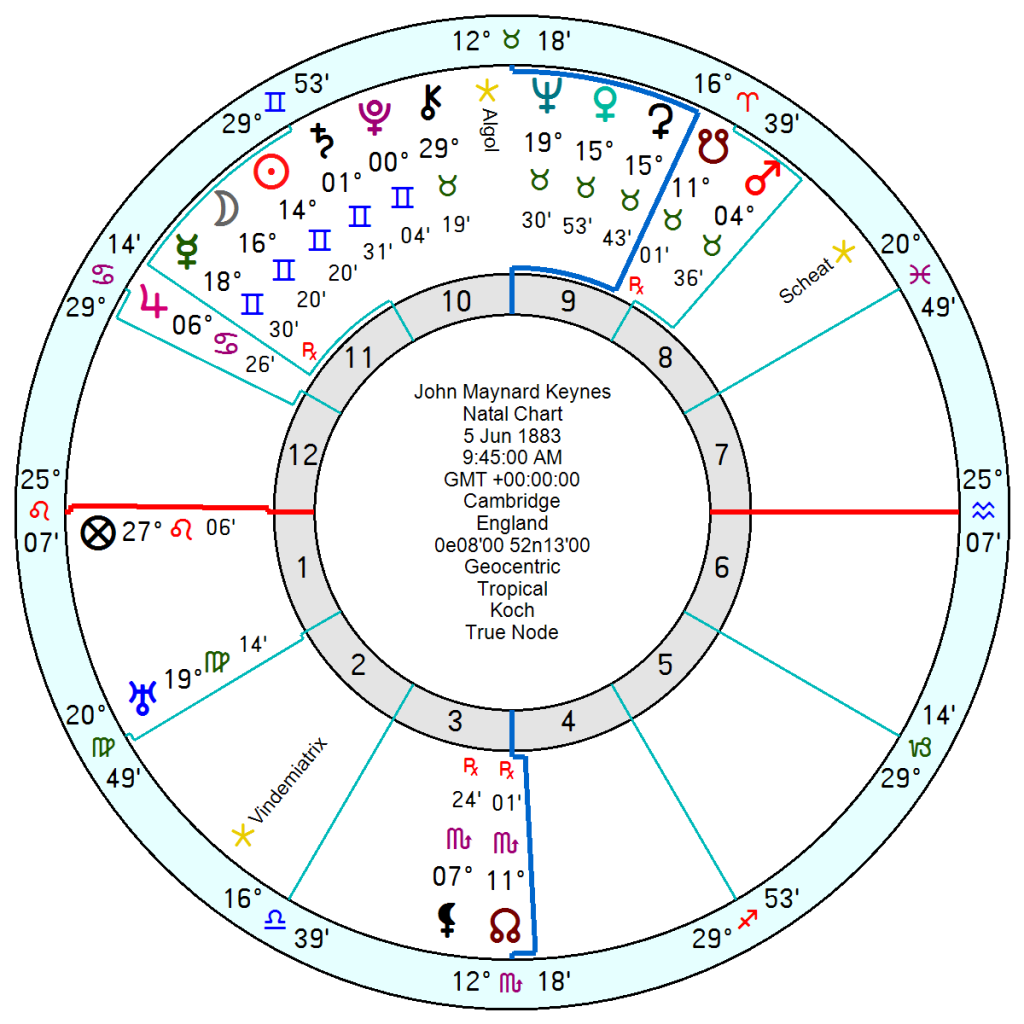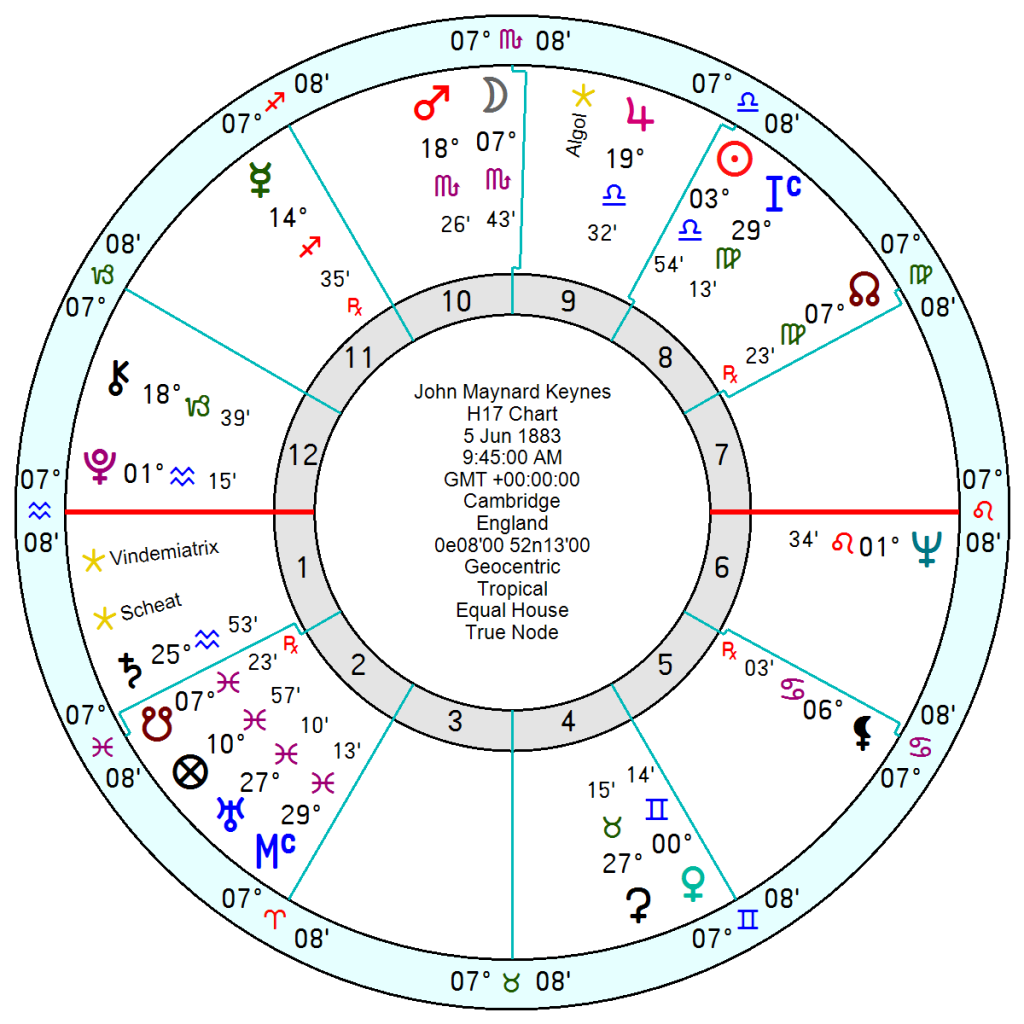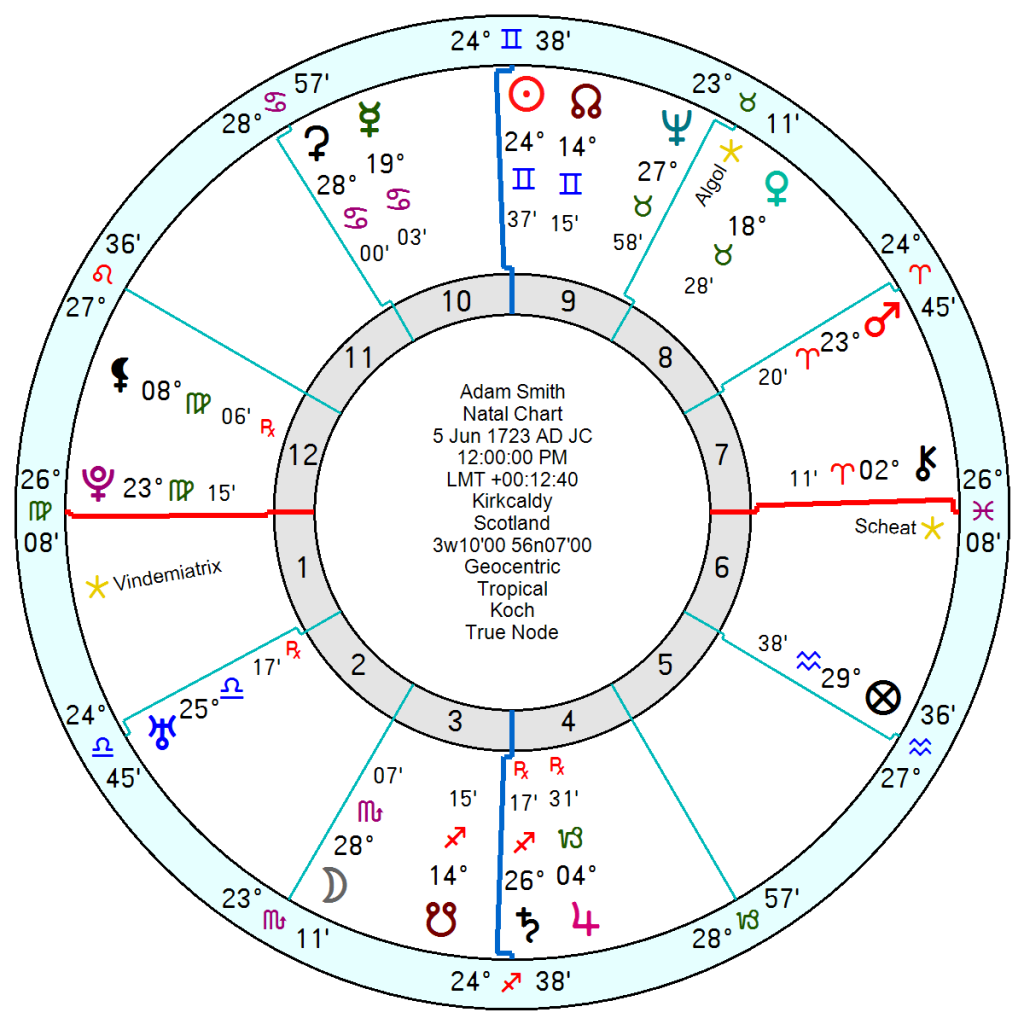



The jungle drums are beating more loudly over worrisome levels of global government and corporate debt with the money wonks cautioning that America now owes more money than the value of its economy.
Quite what John Maynard Keynes would have made of it, the English economist whose ideas fundamentally changed the theory and practice of macroeconomics and the economic policies of governments, isn’t clear. But his ideas were a guiding light from the Great Depression to the mid 1970s, and came back into favour in 2008 with the financial crash. So his spirit will be hanging over policy discussions.
Keynes was born 5 June 1883 9.45 am Cambridge, England, and he had an extraordinary chart with seven planets in his career 10th – stretching from Venus Neptune in Taurus close to his Midheaven, Saturn Pluto conjunct in early Gemini and a New Moon and Mercury conjunct in mid Gemini. He had Mars in earthy Taurus in his communicative, far-travelled 9th house sextile Jupiter. And an inventive Uranus on the cusp of his 2nd house of finances trine Neptune Venus and Midheaven.
His 17th harmonic = leaving-a-legacy-for-history is exceptionally noteworthy with an Air Grand trine of Sun trine Venus trine Pluto; formed into two Kites by Pluto opposition Neptune and Sun opposition Uranus.
With tr Uranus approaching the conjunction to the Pluto Saturn in Gemini on his chart from mid 2025 into 2026 it might seem likely that his ideas in handling crises periods (indicated by his hardship, deprived Saturn Pluto) might come to the forefront.
Oddly enough his Gemini Sun is mirrored in the chart of Adam Smith, the 18th century pioneer in the field of political economy seen by some as “The Father of Economics” or “The Father of Capitalism. Born 5 June 1723 JC in Kirkcaldy, Scotland, he had a Gemini Sun opposition Saturn with Neptune and Venus in Taurus like Keynes in his case trine Pluto. With an excitable, outspoken Uranus opposition Mars square Mercury.
Theoretical economics is absolutely not my subject. Comments welcome from those more knowledgeable.
ADD ON: Keynes’ romantic life initially was homosexual with a string of sometimes concurrent lovers. The artist Duncan Grant was the love of his life for seven years up to 1915. Then he started to gravitate towards women, falling in love in 1921 with Lydia Lopokova, one of the stars of Sergei Diaghilev’s Ballets Russes. In the early years of his courtship, he maintained an affair with a younger man in tandem with Lopokova, but eventually chose Lopokova exclusively. They were married in 1925, with Keynes’s former lover Duncan Grant as best man in what proved to be a stable, happy union until Keynes’ death in 1946.
With such a heavily populated 10th house Keynes’ relationship with his mother would have been a profound influence on him. His biographer remarked that her children “never outgrew home”. Keynes’ also had a New Moon which tends to give a tendency towards self-sufficiency and that squares Uranus so he would be wary of intimacy and close committed relationships.
His relationship with Lydia, whose birthdate varies between 21 October 1891 and 1892 started when tr Uranus had moved into his 7th house altering his approach to close relationships. Neither of those years for her birth indicate a startling connection.
His relationship life is a mystery since even his liaison with Duncan Grant was not obviously a soulmate match.

Thanks for looking at Keynes. He has a strong chart. The strong Gemini focus shows he was flexible and able to change his mind as circumstances change.
One notable fact was that both his parents were alive at his death and attended his memorial service in Westminster Abbey – cradle to grave relationship. His widow survived him for 35 years only dying in 1981.
Gemini ruling the 3rd house represents the early formative years and communication. The glyph for Gemini is parallel lines – a twin approach. Maynard Keynes certainly embodied parallel living. Externalising his bisexuality. His Pluto/Chiron conjunction, plus Pluto being the anchor planet for his Saturn/Chiron midpoint – points to a childhood deep wound. Perhaps not feeling nurtured by the mother and identifying more with his father? Or with neither of them? The proclivity of planets in Gemini an air sign, may make it hard for a young mind to process feelings. As his Mercury was square Uranus and his Mars ( masculinity) was conjunction Jupiter in Cancer – Water/Earth – mud. His Venus/Neptune another mud combination. Emotionally he may have found his feelings a confused mess. I get the feeling his Uranus opposition anchored them. As far as his economics theory and Uranus square Mercury methods are concerned. They were formed as a young man. Perhsos not moving on from his initial theories?
Past Chancellors of the Exchequer always say how Keynes inspired their budgets. This always leaves me feeling somewhat depressed. And I never find their budgets at all inspiring.
It also shows that many chancellors are unwilling to take responsibility for their own budgets. Or move on from others people’s ideas. Not in today’s world!
Just a thought about the Gemini emphasis in both Keynes’ and Smith’s astrology. The Roman Mercury as well as the earlier Greek Hermes was also the god of wealth, financial gain, and in fact considered the Patron of trade and commerce. Hermes/Mercury’s relation to business and speed survives in words like “mercurial” and “mercantile. Representations of the god show him wearing a wide brimmed traveller’s hat, indicating his communication and swiftness, but he also carries a purse. The purse signifies his role as the Greek god of riches, trade and good fortune and the Roman god of trade, profit and merchants. In JMK’s case this is given weight with the presence of Pluto – the god of riches (see ‘Plutocrat, Plutocracy’) at 0 degrees of the sign of Gemini.
Interesting to see how Keynes’ Taurus line-up connects with the UK Neptune 18 Scorpio, and its 11 Taurus Mars across the financial 2nd and 8th houses. UK’s financial Venus 16 Aquarius completes the picture perhaps.
Also interesting to wonder about his key involvement with the Bloomsbury Group, his art collection, and the unconventional side of his personality.
“Keynes’s recruitment to the Treasury as a negotiator and advisor during the First World War lead to a cooling off in his relationship with the Bloomsbury artists as his position clashed with their pacifist ideals. He did however use his influence to obtain military exemptions for Grant, the Strachey brothers and David Garnett. Keynes married Lydia Lopokova, a ballerina with the Russian Ballet, in 1925. In the 1940s he was appointed chairman of CEMA (Council for the Encouragement of Music and the Arts) which later became The Arts Council.”
tate.org.uk
These huge debts make me so nervous, but considering all the financial tricks we’ve seen in recent decades, they’ll probably find a way of writing it all off somehow.
‘…… they’ll probably find a way of writing it all off somehow.’
Jane, whether they do or not it’s all in the numbers and the reality that the world’s greatest economy ain’t so great on the balance sheet. They just don’t play by the same rules the IMF hold others ransom to.
Here is the current USA biwheel with Saturn, denoting the economy.
https://ibb.co/Hxt5yBp
Where in his chart is his love for his wife, Russian ballerina Lydia Lopokova? Keynes, whose prior relationships were homosexual, fell madly in love with her and remained so enchanted by her all of his life. Most of his friends, including Wittgenstein, found her appalling. Always found it an odd but great love story.
Uranus is the planet, along with Venus which moves in the opposite direction to the other planets. Quite revealing he fell into a sensual loving feeling for a woman – Taurus Earth /Venus conjunct Neptune. Just when Uranus was approaching its opposition, igniting a unison with the opposite to what he had.
Just another point. He was not homosexual he was bisexual. His Gemini mind would be open to either/or. Both the lights Sun/Moon were in Gemini. Venus/Neptune allowed him a romantic physical feeling, whereas Mars in Taurus may was just been physical? Maybe she gave him an opening to his emotions, which Saturn/Chiron midpoint on Pluto had suppressed?
Keynes worked for the Indian government as an economist in the Treasury
Department. Saturn rules economists. In Indian astrology we use the
Divisional 10 chart for career. Below is Keynes and Smith’s D-10 chart for
career. As you can see Saturn is prominent in both men’s D-10 chart.
https://postimg.cc/B8h5ZvP8
Economy theorists help answer questions like why prices rise or fall, why some industries thrive while others decline, and how people make choices about what to buy and produce. They seek to make predictions about future economic events and trends. By understanding past and present economic behavior, economists can forecast potential outcomes, which can guide individuals, businesses, and policymakers in their decision-making.
Economy theorists would help decide whether I should buy or sell
a certain stock.
Not certainly ..economics is theory…practical are numbers…economics is based solely on supply and demand but then there are those who insert prices to taxes and the supply demand becomes insignificant
Buying and selling should depend on need primarily and never on impulse.
Also Neptune in 10th house in Jupiter indicates financial industry like banking…where all economics comes to life